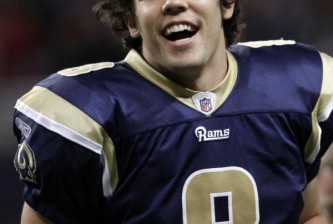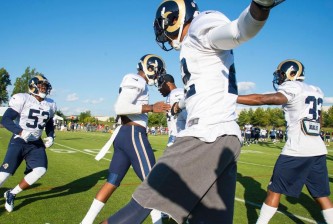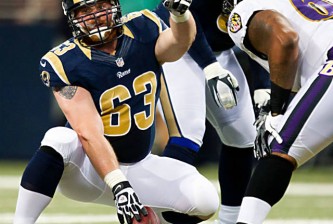Reading this excellent article by Jason Cole at Yahoo Sports, “A Step-by-step Guide to Drafting a Quarterback,” I see a series of red flags for the Rams as they consider trying to find their quarterback of the future in this year’s draft. Perhaps ironically, these red flags correspond to the three steps of Cole’s advice to teams who are hoping to avoid an Alex Smith type of mistake.
Do the Rams understand the faults of their targeted player(s)? If there’s one constant meme in this year’s quarterback draft class, it’s that each player carries a significant flaw. Sam Bradford has consistently operated under shotgun, in a non-pro-style spread offense, and facing little pass pressure. Jimmy Clausen has worked in a pro-style offense, but has question marks surrounding his temperament and some elements of his mechanics. Colt McCoy and the lower-tier QBs will all need a long development time.
Cole writes:
The 49ers didn’t understand one of Smith’s biggest flaws. He had run a system in college (the Urban Meyer spread formation) that required relatively simple reads. While Smith was good at it, the combination of shifting to a pro-set offense and learning to take the ball from under center was too much for him early on.
The pressing question facing the Rams is: are they forced to pick from a less-than-stellar list of QBs this year, whose faults outweigh their benefits? Alex Smith was a flawed pick for many reasons, including those mentioned, but he was a terrible pick at #1 overall. The 49ers had such a desperate need at QB that they overlooked the fact that the 2005 draft class was quarterback-poor. Of the QBs taken, only Aaron Rodgers (1st round, 24th pick) and Derek Anderson (5th round) have had Pro-Bowl seasons; Rodgers benefited from years on the bench behind a hall-of-famer, and Anderson is now in a serious decline after what looks like a fluke season.
The Rams may be facing a similar draft class, despite the Sam Bradford hype machine that wants to put him ahead of last year’s picks in Stafford and Sanchez.
Do the Rams have a commitment to restocking their offensive weapons?
Here is where the example of the 49ers raises a huge red flag for the Rams. Cole compares the high-round draft moves (Edgerrin James, Reggie Wayne, and Dallas Clark) made by the Colts in the years following the Manning draft, and the moves made by the Steelers (Heath Miller, Santonio Holmes, Rashard Mendenhall) after drafting Roethlisberger. Likewise, you can look at the aggressive moves Atlanta made (signing top free agents Michael Turner from San Diego and Tony Gonzalez from Kansas City) to support the drafting of Matt Ryan.
But, as Cole writes, teams with young “bust” QBs did not follow suit:
By contrast, after the 49ers took Smith in 2005, they used their 2006 pick on tight end Vernon Davis but didn’t take a wide receiver in the top two rounds until Michael Crabtree last year. In Oakland, the Raiders have turned the wide receiver position into a revolving door, although they did take Darrius Heyward-Bey in the first round this year. That said, Heyward-Bey appears to be a hyphenated way to spell bust.
One could argue that only Mike Singletary’s intervention and Vernon Davis’ sudden breakthrough into a mature football player has kept Smith’s career alive at this point.
The Rams may not lack the will in coming years, but aside from Jason Smith, they have not added first-round talent on offense in some time. You have to go back to the drafting of Jackson to find a first-round pick used on a skill player. And the free agent class simply is not there this offseason, to add players of the caliber of Gonzalez and Turner without losing something of equal value in trade.
Most importantly, do the Rams have a commitment to their plan on offense?
San Francisco 49ers owner and team president Jed York summed it up in early February as he looked back at the selection of quarterback Alex Smith with the No. 1 overall draft pick in 2005.
“If I knew that we were going to go through five offensive coordinators in his first five years, I never would have had us take Alex,” York said. “It hasn’t been fair to him or to the team.”
The Rams took a huge gamble by hiring a trio of rookie coaches — Spagnuolo as a first-time head coach, Ken Flajole as a first-time defensive coordinator, and Pat Shurmur as a first-time offensive coordinator. Of the three, Shurmur is on the shortest leash by far.
The Rams’ offense has the only “A+” player on the entire team, Steven Jackson, but even when elements of the offense were clicking, the overall game plan seemed to be continually out of sync. The Rams’ scripted sets of first quarter plays seldom produced points, their halftime adjustments were consistently poor, and their red zone scoring percentage — a factor widely expected to improve, if merely by the law of averages — remained abysmal.
I expect Shurmur to get this next season to show considerable improvement, or face the firing line. The new ownership will not be expected to inherit the patience that the team’s old ownership might have extended beyond this season. And if Shurmur does get replaced, does the entire “hybrid run-based West-Coast Offense” popularized by Jim Zorn’s Seahawks and Redskins — both doormats now — go with it? Is there any more fruit under the Andy Reid coaching tree? Or do the Rams face the prospect of hiring an “experienced” OC that will bring with him a new set of ingrained prejudices about they type of quarterback he needs?
The lesson here is to build a staff where the system can be run as coaches are replaced. This was the genius of what Bill Walsh built with the 49ers once upon a time. When McCarthy left, there should have been a quarterbacks coach or other assistant ready to step into the job.
Or the 49ers should have hired an offensive coach from the start if they were going to rebuild the offense. Former coach Mike Nolan, who made the decision to draft Smith, was a defensive guy. If the coach who drafted Smith had been putting in his own offense, the 49ers and Smith might have overcome the loss of so many offensive coordinators.
Instead, they’re just hoping things get better.
This kind of forward-looking decision is crucial to the Rams’ choice at quarterback. The Rams must be able to confidently answer all three questions before drafting “the Future” at QB. I’m less than confident, myself.






















